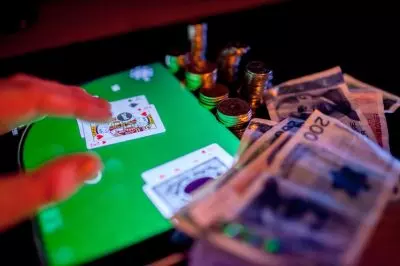 Although the coronavirus pandemic closed the majority of retail venues and kept Pennsylvanian people home for months, a surge in online gambling revenues was registered. Unfortunately, there was also an increase in the number of professional help requests from people dealing with gambling addiction.
Although the coronavirus pandemic closed the majority of retail venues and kept Pennsylvanian people home for months, a surge in online gambling revenues was registered. Unfortunately, there was also an increase in the number of professional help requests from people dealing with gambling addiction.
The Government of Pennsylvania made online gambling legal in 2017, with the relatively new form of gambling emerging as the financial salvation for the state’s gambling sector at a time when the revenue generated by the majority of regular casinos suffered a massive decline as a result of the social distancing measures imposed because of the coronavirus. The closures forced local people to stay at home but at the same time, they were able to gamble online 24/7, which increased the chances for them facing the negative consequences of compulsive gambling.
One of the prevention specialists who work at WellSpan Health, Jeff Mountz, explained that most people who gamble are actually responsible when doing so. However, at the same time, others find it hard to control their gambling – a habit that could cost them much not only financially but also to affect other aspects of their lives.
Some Pennsylvanian People Used Online Gambling as Coping Mechanism to Fight Stress
 The executive director of the Council on Compulsive Gambling of Pennsylvania, Josh Ercole, revealed that in 2020, there was a major change in the types of gambling addictions for which people sought professional help. Mr. Ercole explained that even though almost the same number of phone calls was registered by the problem gambling helpline in 2019 and 2020, there were still significant differences.
The executive director of the Council on Compulsive Gambling of Pennsylvania, Josh Ercole, revealed that in 2020, there was a major change in the types of gambling addictions for which people sought professional help. Mr. Ercole explained that even though almost the same number of phone calls was registered by the problem gambling helpline in 2019 and 2020, there were still significant differences.
A significant decline was registered at the early part of the pandemic, followed by a massive increase in the rates when stricter social distancing measures were implemented. Many of the calls received by the hotlines were focused on the negative effects of online gambling.
Furthermore, the Council on Compulsive Gambling of Pennsylvania registered an increase in the number of people contacting it by the use of other methods, including the available text features or chat.
Mr. Ercole explained that the legalization of online gambling made these services extremely easy for Pennsylvanian people to access. Furthermore, the social isolation at times when most of them were forced to stay at home and felt stressed and anxious, was a factor that should not be underestimated when it comes to evaluating the increase in online gambling participation and gambling addiction rates.
Online gambling has become increasingly popular among residents of Pennsylvania thanks to its easy access, allowing them to place a bet regardless of their location or occupation.
A local professional counselor, Kenneth J. Sutton, explained that visiting a casino or other gambling venue requires a physical presence that makes the experience more real for players, especially for the ones who find it hard to control their gambling. It is not that uncommon for players who gamble online to spend too much time or money because all they do is click and, to some of them, the experience does not seem like spending real money.
Mr. Sutton, who has been dealing with various addiction types, including problem gambling, in his professional experience, said that the act of gambling has grown to feel more normal when online, especially considering the fact that digitalization has taken over many aspects of people’s lives.
Online Gambling on the Rise in the State of Pennsylvania
 On the other hand, online gambling has pretty much become the lifebelt for gambling operators in Pennsylvania. Because revenues from traditional casino gambling in the state suffered a sharp decline as a result of some closures, online gambling revenue saw a staggering increase from $33.6 million generated in 2019 to $565.8 million in 2020.
On the other hand, online gambling has pretty much become the lifebelt for gambling operators in Pennsylvania. Because revenues from traditional casino gambling in the state suffered a sharp decline as a result of some closures, online gambling revenue saw a staggering increase from $33.6 million generated in 2019 to $565.8 million in 2020.
For a few years, industry investors have been saying that digitalization would be the future of the gambling sector.
In 2020, one of the major gambling operators of physical casino venues – Penn National Gaming – revealed its decision to take over a stake in Barstool Sports. As explained at the time, the purchase would give Penn National access to Barstool’s offering of online gambling products. According to CNBC, the performance of the company since its stock was added to the S&P 500 in March 2021 has been satisfactory, with stakeholders emphasizing the potential in online gambling to make the company more attractive to consumers.
At the time, the vice president for public affairs at Penn National, Jeff Morris, confirmed that both Penn National and Barstool Sports follow responsible gambling procedures and take compliance protocols very seriously. Mr. Morris shared that a large number of the company’s customers are interested in various forms of gambling and non-gambling services of the company.
Apart from all this, the legalization of online gambling in Pennsylvania has led to a shift not only in the preferred forms of gambling but also in the customer base. The Council on Compulsive Gambling of Pennsylvania’s executive director revealed that, at the time when the new form of gambling became legal in the state, it was mostly younger people who took part in such gambling. There were many more gamblers aged from 21 to 35 who preferred playing online than the typical audience of brick-and-mortar casinos, whose visitors were usually 45 and older.
The coronavirus pandemic changed that, as many more people who preferred gambling in physical casinos started gambling online.
Pennsylvania to See the Full Effects of Coronavirus Pandemic on Problem Gambling in a Few Years
 For many years, the dangers associated with problem gambling have been ignored, unlike the ones related to other addictions. However, research has shown that gambling addiction could bring consequences that are equally problematic in the longer term.
For many years, the dangers associated with problem gambling have been ignored, unlike the ones related to other addictions. However, research has shown that gambling addiction could bring consequences that are equally problematic in the longer term.
On the other hand, what also makes problem gambling so complex is the fact that the addiction is not the same for everyone who deals with it and depends on various factors associated with the affected person’s character and way of life, with financial matters having nothing to do with the gambling problems that are being faced by the players.
According to experts, some of the key symptoms and signs that someone could be facing some problems to control their gambling include the belief they are the ones who control the situation, or the classic “gambler’s fallacy”.
The coronavirus pandemic also affected the gambling addiction rates, with the Council saying years may pass before the Pennsylvanian authorities see the full impact that the Covid-19 crisis had on local gamblers.